Related Research Articles
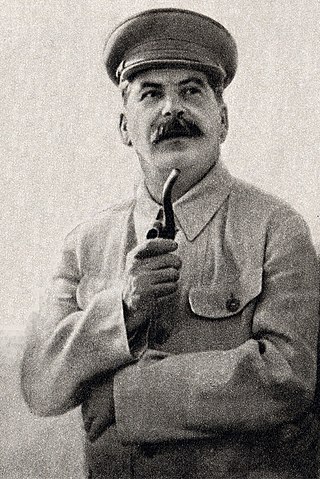
Joseph Vissarionovich Stalin was a revolutionary in the Russian Empire and political leader who led the Soviet Union from 1924 until his death in 1953. He held power as General Secretary of the Communist Party of the Soviet Union (1922–1952) and Chairman of the Council of Ministers of the Soviet Union (1941–1953). Initially governing the country as part of a collective leadership, he consolidated power to become a dictator by 1928. Ideologically adhering to the Leninist interpretation of Marxism, he formalised these ideas as Marxism–Leninism, while his own policies are called Stalinism.
Marxism–Leninism is a communist ideology that was the main communist movement throughout the 20th century. Developed in Russia by the Bolsheviks, it was the state ideology of the Soviet Union, Soviet satellite states in the Eastern Bloc, and various countries in the Non-Aligned Movement and Third World during the Cold War, as well as the Communist International after Bolshevisation. Today, Marxism–Leninism is the ideology of the ruling parties of China, Cuba, Laos and Vietnam, as well as many other Communist parties. The state ideology of North Korea is derived from Marxism–Leninism. Marxist–Leninist states are commonly referred to as "communist states" by Western academics. Marxist–Leninists reject anarchism and left communism, as well as reformist socialism and social democracy. They oppose fascism, imperialism, and liberal democracy. Marxism–Leninism holds that a two-stage communist revolution is needed to replace capitalism. A vanguard party, organized through democratic centralism, would seize power on behalf of the proletariat and establish a one-party socialist state, called the dictatorship of the proletariat. The state would control the means of production, suppress opposition, counter-revolution, and the bourgeoisie, and promote Soviet collectivism, to pave the way for an eventual communist society that would be classless and stateless.

Nazi Germany was the German state between 1933 and 1945, when Adolf Hitler and the Nazi Party controlled the country, transforming it into a dictatorship. Under Hitler's rule, Germany quickly became a totalitarian state where nearly all aspects of life were controlled by the government. The Third Reich, meaning "Third Realm" or "Third Empire", alluded to the Nazi claim that Nazi Germany was the successor to the earlier Holy Roman Empire (800–1806) and German Empire (1871–1918). The Third Reich, which Hitler and the Nazis referred to as the Thousand-Year Reich, ended in May 1945 after just 12 years when the Allies defeated Germany, ending World War II in Europe.
Socialism is a political philosophy and movement encompassing a range of economic and social systems, which are characterised by social ownership of the means of production, as opposed to private ownership. As a term, it describes the economic, political and social theories and movements associated with the implementation of such systems. Social ownership can be public, community, collective, cooperative, or employee. While no single definition encapsulates the many types of socialism, social ownership is the one common element, and is considered left-wing. Different types of socialism vary based on the role of markets and planning in resource allocation, on the structure of management in organizations, and from below or from above approaches, with some socialists favouring a party, state, or technocratic-driven approach. Socialists disagree on whether government, particularly existing government, is the correct vehicle for change.
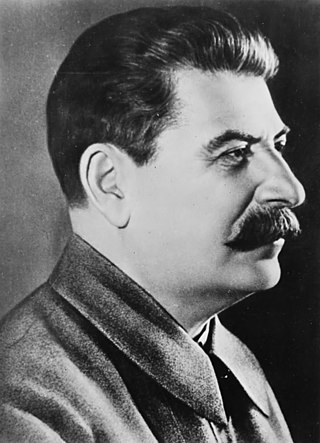
Stalinism is the means of governing and Marxist–Leninist policies implemented in the Soviet Union from 1927 to 1953 by Joseph Stalin. It included the creation of a one-party totalitarian police state, rapid industrialization, the theory of that socialism in one country, collectivization of agriculture, intensification of class conflict, colonization of Eastern Europe, a cult of personality, and subordination of the interests of foreign communist parties to those of the Communist Party of the Soviet Union, deemed by Stalinism to be the leading vanguard party of communist revolution at the time. After Stalin's death and the Khrushchev Thaw, de-Stalinization began in the 1950s and 1960s, which caused the influence of Stalin’s ideology begin to wane in the USSR. The second wave of de-Stalinization started during Mikhail Gorbachev’s Soviet Glasnost.

The Communist International (Comintern), also known as the Third International, was a Soviet-controlled international organization founded in 1919 that advocated world communism. The Comintern resolved at its Second Congress to "struggle by all available means, including armed force, for the overthrow of the international bourgeoisie and the creation of an international Soviet republic as a transition stage to the complete abolition of the state". The Comintern was preceded by the 1916 dissolution of the Second International.
The Polish Operation of the NKVD in 1937–1938 was an anti-Polish mass-ethnic cleansing operation of the NKVD carried out in the Soviet Union against Poles during the period of the Great Purge. It was ordered by the Politburo of the Communist Party against so-called "Polish spies" and customarily interpreted by NKVD officials as relating to 'absolutely all Poles'. It resulted in the sentencing of 139,835 people, and summary executions of 111,091 Poles living in or near the Soviet Union. The operation was implemented according to NKVD Order No. 00485 signed by Nikolai Yezhov.
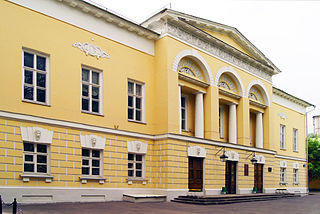
The International Lenin School (ILS) was an official training school operated in Moscow, Soviet Union, by the Communist International from May 1926 to 1938. It was resumed after the Second World War and run by the Communist Party of the Soviet Union; it continued until the end of the Soviet Union. The ILS taught both academic courses and practical underground political techniques with a view to developing a core disciplined and reliable communist political cadres for assignment in communist parties around the world.

Wolfgang Leonhard was a German political author and historian of the Soviet Union, the German Democratic Republic and Communism. A German Communist whose family had fled Hitler's Germany and who was educated in the Soviet Union, after World War II Leonhard became one of the founders and leaders of the German Democratic Republic until he became disillusioned and fled in 1949, first defecting to Yugoslavia and then moving to West Germany in 1950 and later to the United Kingdom. In 1956 he moved to the United States, where he was a popular and influential professor at Yale University from 1966 to 1987, teaching the history of communism and the Soviet Union, topics about which he wrote several books. After the Cold War ended, he returned to Germany.

Hans Beimler was a trade unionist, Communist Party official, deputy in the 1933 Reichstag, an outspoken opponent of the Nazis and a volunteer in the international brigades fighting for the Spanish Republic.
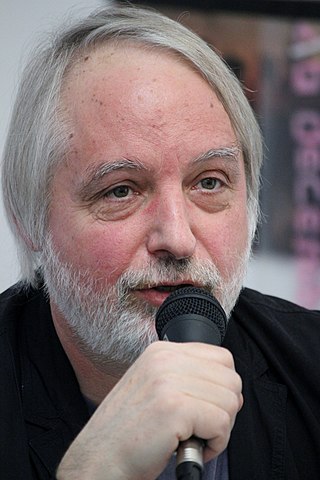
Nikita Vasilyevich Petrov is a Russian historian. He works at Memorial, a Russian organization dedicated to studying Soviet political repression. Petrov specializes in Soviet security services.

The Polish minority in Belarus numbers officially 288,000 according to 2019 census. However, according to the Ministry of Foreign Affairs of Poland the number is as high as 1,100,000. It forms the second largest ethnic minority in the country after the Russians, at around 3.1% of the total population. An estimated 205,200 Belarusian Poles live in large agglomerations and 82,493 in smaller settlements, with the number of women exceeding the number of men by 33,905. Some estimates by Polish non-governmental sources in the U.S. are higher, citing the previous poll held in 1989 under the Soviet authorities with 413,000 Poles recorded.

Arseny Borisovich Roginsky was a Soviet dissident and Russian historian. He was one of the founders of the International Historical and Civil Rights Society Memorial, and its head since 1998.

Hotel Lux (Люксъ) was a hotel in Moscow during the Soviet Union, housing many leading exiled and visiting Communists. During the Nazi era, exiles from all over Europe went there, particularly from Germany. A number of them became leading figures in German politics in the postwar era. Initial reports of the hotel were very good, although its problem with rats was mentioned as early as 1921. Communists from more than 50 countries came for congresses, for training or to work. By the 1930s, Joseph Stalin had come to regard the international character of the hotel with suspicion and its occupants as potential spies. His purges created an atmosphere of fear among the occupants, who were faced with mistrust, denunciations, and nightly arrests. The purges at the hotel peaked between 1936 and 1938. Germans who had fled Nazi Germany, seeking safety in the Soviet Union, were interrogated, arrested, tortured, and sent to forced labour camps. Most of the 178 leading German communists who were killed in Stalin's purges were residents of Hotel Lux.
The Karl Liebknecht School, named after Karl Liebknecht, was a German-language elementary school in Moscow. It was established for the children of German refugees to the Soviet Union. It opened in 1924 and was closed in 1939. A number of students and teachers were caught up in the Great Purge and the so-called Hitler Youth Conspiracy, many of them executed.
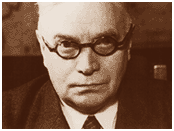
Gustav Sobottka was a German politician in East Germany. He was a member of the Communist Party and was in exile during the Nazi era. He returned to Germany in 1945 as head of the Sobottka Group and later worked in the East German government.
The Hitler Youth conspiracy was a case investigated by the Soviet secret police during the Great Purge in the late 1930s. It resulted in the arrest of numerous adolescent Germans, some in their twenties and beyond. They were accused of having been fascist, anti-communist members of the Hitler Youth, who were working against the Soviet Union. Teenagers from the Karl Liebknecht School, from Children's Home No. 6, and adults from factories and elsewhere were arrested, tortured, and imprisoned. Many were executed or died in custody. Some were the children of leading communists. Within years, the investigation was found to have been faulty and a number of the investigators were also arrested, with sentences ranging from imprisonment to execution. In the 1950s, following the death of Joseph Stalin, a new examination of the files revealed many of the accusations to have been baseless and a number of the victims were rehabilitated.
The Left Column was an agitprop theater troupe during the 1920s and 1930s. The troupe worked in support of the Workers International Relief (WIR). During the Nazi era, some of the group went into exile in the Soviet Union, where some of the members were arrested by the Soviet secret police in the Great Purge and in connection with the Hitler Youth Conspiracy.

Helmut Damerius was a German communist, theatre director, writer and the founding member of the Left Column, an agitprop theater group. As the Nazi Party gained in strength, he went into exile in Moscow, only to be arrested in the so-called Hitler Youth Conspiracy and sentenced to a long term in a Soviet prison. After his prison sentence, he was banished to Kazakhstan and was not permitted to move elsewhere. In 1956, he received permission to move to East Germany, where he stayed until his death.
Gustav Sobottka Jr. was a German communist and the son of Communist Party functionary and trade unionist Gustav Sobottka. He spent several months in Nazi concentration camps, then left Germany, eventually living in exile in the Soviet Union. He was arrested by the Soviet secret police at the age of 23 and accused of being part of the so-called Hitler Youth Conspiracy. Sobottka died in a Soviet prison.
References
- ↑ Barry McLoughlin, Kevin McDermott (Eds.), Stalin's Terror: High Politics and Mass Repression in the Soviet Union Palgrave Macmillan (2003), p. 182. ISBN 1-4039-0119-8. Retrieved November 29, 2011
- 1 2 3 Barry McLoughlin, Kevin McDermott (2003), p. 219
- ↑ Atina Grossmann, "German Communism and New Women" in: Helmut Gruber and Pamela M. Graves (eds.) Women and Socialism, Socialism and Women: Europe Between the Two World Wars (1998), pp. 160. Berghahn Books. ISBN 1-57181-152-4 Retrieved November 13, 2011